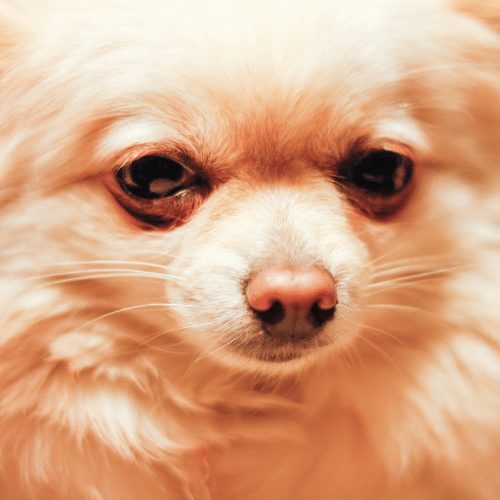Pomchi
May 26, 2021 2021-12-28 18:28Table of Contents

Origin and History of the Pomchi
The Pomchi is a relatively new dog breed since its standard was approved by the Pomchi Club of America in 1998. It resulted from a combination between the Chihuahua and the Pomeranian.
For this reason, Pomchis do not only go by this name. Some people call them Pomachi, others Chiranian, and some dogs have even been referred to as Chiapom. To find out more about this beautiful and energetic dog breed and its ancestors, keep on reading.

Pomeranian
Pomeranians are loved across the world, but the place where they are extremely popular is the United States. This dog weighs in at 4 to 8 pounds and measures 6 to 7 inches in height, with Teacup Pomeranians being even smaller.
Pomeranians are descendants of the German Spitz, and they have this name because they hail from a region in Germany called Pomerania. With their pretty eyes and button noses, these dogs are endearing but also very intelligent and alert.
This dog breed is likely to develop certain medical problems, such as luxating patella or tracheal collapse.
Chihuhuas
Chihuahuas are known for their temperament. Weighing in at around 6 pounds and measuring just 5 to 7 inches in height, these little dogs are fierce protectors of their loved ones. They can often intimidate other people merely by barking at them. In the last two decades, the extra small version of Chihuahuas (so-called Teacup Chihuahuas) has become increasingly sought-after.
Chis are sweet, adorable, and loving, but they are also full of energy and just as alert as Pomeranians (and other small dog breeds). They come in a wide range of colors and patterns, many of which they pass on to their Pomchi offspring.
Chihuahuas are genetically predisposed to developing some health issues, such as tracheal collapse, Legg-Perthes disease, and epilepsy.

Appearance of the Pomchi
Since this is a mixed breed, it is impossible to predict what the puppies will look like. They might take after their Chihuahua side and have shorter hair or they might take after their Pomeranian side and be relatively fluffy.
In general, however, Pomchis can be compared to little foxes. They have large and round eyes, upright ears, and a partly curled tail. Although most of them are orange, it’s not uncommon for some Pomchis to be cream or chocolate.
This breed measures around 6 to 7 inches in height and can have a weight ranging from 6 to 12 pounds. The latter is more common in males, whereas the former is more common in females.
Temperament of the Pomchi
As is the case with its appearance, it is practically impossible to predict the personality of a Pomchi. Generally, Pomchis are affectionate and alert, intelligent, and full of energy, and they are considered excellent watchdogs.
Something they are not, on the other hand, is quiet. They can also be a little stubborn, which is why they might be challenging to train. They love to play, but they are also fragile, so avoid handling them too enthusiastically.
Another detail that needs to be considered if you are planning on becoming a Pomchi guardian is that they tend to suffer from separation anxiety. This is not a dog that does well when left alone for many hours at a time. Therefore, if you’re usually away from home for more than 8 hours a day, it might not be the perfect breed for you.

Health and Care
Since the breed is so new, it can be difficult to tell just what health issues it is prone to developing. However, it wouldn’t be far-fetched to assume that it can inherit some of the conditions that its Chihuahua and Pomeranian ancestors are more likely to develop. Here are several examples:
- Corneal dystrophy
- Glaucoma
- Patellar luxation
- Entropion
- Tracheal collapse
- Hydrocephalus
In terms of care, one to two veterinary check-ups per year are the best way of going about things. Like many other small breeds, Pomchis can easily put on weight, so you have to be careful not to give them too many snacks.
To feel good, these dogs need at least one hour of playtime and/or exercise per day. Otherwise, they have no means of consuming their energy. Managing an overly active Pomchi can be difficult.
Some dogs are prone to developing dental health issues, which is why you will have to brush your canine friend’s teeth at least once every couple of days.
Pomchi Grooming Tips
This dog breed is the owner of a double coat. Therefore, in order to prevent tangling and matting, you will have to brush your pet’s coat at least once a week. Some dog parents find that doing it twice a week is better.
In spite of their double coat, Pomchis do not handle the cold well, which means that giving your dog a haircut, especially if you live in a colder climate, is not a good idea.
Even though they don’t tend to shed a lot, they definitely do it seasonally. They are not recommended for people who have allergies or asthma.
Training Your Pomchi
The best way to train a Pomchi puppy is to offer them delicious rewards. Punishment does not work, and it might make your pooch adopt a defensive behavior. However, these dogs are very responsive when it comes to food, so use this information to your advantage when training your Pomchi.
All puppies have to be socialized, whether that happens at the kennel or in your home. If you don’t get your canine buddy accustomed to other people and other animals, they might become aggressive and loud when meeting strangers.
Since this breed tends to bark a lot, you have to keep your dog occupied all the time. Get some toys and alternate them so that your puppy doesn’t get bored of any.

Deciding on a Pomchi
Telling whether a Pomchi is the right dog breed for your personality, schedule, and expectations can be a little difficult. These dogs can live for anything between 12 and 15 years, so you are making a long-term commitment when you adopt or buy a Pomchi.
If you’d like to experience how it would be to care for a Pomchi, you can look for social media groups where owners communicate with each other. Puppy meetups are quite common in some regions. Another idea would be to contact a local breeder and go visit their kennel.
A Pomchi is not the right dog for you if:
- You aren’t willing to invest time in training your puppy
- You’re away from home for many hours during the day
- You aren’t prepared to pay for several vet bills
- You don’t want a dog with a tendency to bark
A Pomchi is the right dog for you if:
- You live in an apartment
- You want a canine friend that lives for at least a decade
- You’re retired or work from home and have plenty of time to care for your dog
- You need an excellent watchdog
Finding a Pomchi Puppy Breeder
Finding a reputable breeder can be extremely important if you want your puppy to be as healthy as possible. Responsible breeders are registered as such, they genuinely care for their dogs’ health, and they also know some things about this breed’s genetics.
A good breeder can always give you at least several references. They will also let you know whether the puppy’s parents have suffered from any conditions, so that you are able to make an informed decision.
Questions for your Pomchi Breeder
- Are the puppies vaccinated?
- Did the puppy’s parents have any health problems?
- What are your references?
- How long have you been breeding Pomchis for?

How much is a Pomchi Puppy?
The average cost of a Pomchi puppy is around $500. However, it varies a lot — from $150 to $1500. Well-bred individuals can be as expensive as $5,000 and more. Don’t make the mistake of thinking that a higher price automatically relates to better puppy health — not all breeders are responsible.
If you are looking to get an especially small Pomchi, expect to pay more. As an offspring of a Teacup Chi and a tiny Pomeranian, both parents will be more pricey – as will be their puppies (Teacup Chis can cost up to $5000!)
There’s also the option of adopting from a shelter if you can’t afford to spend that much on a puppy.
Basic vet care costs approximately $200-$300 a year, whereas food, toys, and accessories can set you back up to $500 per year or more.
What Pomchi Owners Say:
While I did have my doubts about getting such a small and precious dog since I worried about my kids not being careful enough with her, I will say that she has taught them what responsibility is.
She can be a little stubborn sometimes, but life wouldn’t be the same without her.

He’s been reasonably healthy until now, and we hate to think that at one point he might leave us. We’ve never bonded with a pet more than we did with him.


